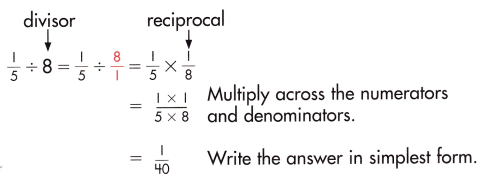Practice with the help of Spectrum Math Grade 5 Answer Key Chapter 6 Lesson 6.5 Dividing Fractions by Whole Numbers regularly and improve your accuracy in solving questions.
Spectrum Math Grade 5 Chapter 6 Lesson 6.5 Dividing Fractions by Whole Numbers Answers Key
To divide a whole number by a fraction, first write the whole number as a fraction. Then, multiply by the reciprocal of the divisor.

Divide. Write answers in simplest form.
Question 1.
a. \(\frac{1}{3}\) ÷ 3 = ________________
Answer:
\(\frac{1}{9}\)
Explanation:
Given,
\(\frac{1}{3}\) ÷ 3
To divide a whole number by a fraction,
first write the whole number as a fraction.
\(\frac{1}{3}\) ÷ \(\frac{3}{1}\)
Then, multiply by the reciprocal of the divisor.
\(\frac{1}{3}\) × \(\frac{1}{3}\)
Multiply across numerators and denominators.
\(\frac{1 \times 1}{3 \times 3}\) = \(\frac{1}{9}\)
b. \(\frac{1}{5}\) ÷ 8 = _______________
Answer:
\(\frac{1}{40}\)
Explanation:
Given,
\(\frac{1}{5}\) ÷ 8
To divide a whole number by a fraction,
first write the whole number as a fraction.
\(\frac{1}{5}\) ÷ \(\frac{8}{1}\)
Then, multiply by the reciprocal of the divisor.
\(\frac{1}{5}\) × \(\frac{1}{8}\)
Multiply across numerators and denominators.
\(\frac{1 \times 1}{5 \times 8}\) = \(\frac{1}{40}\)
c. \(\frac{1}{6}\) ÷ 5 = _______________
Answer:
\(\frac{1}{30}\)
Explanation:
Given,
\(\frac{1}{6}\) ÷ 5
To divide a whole number by a fraction,
first write the whole number as a fraction.
\(\frac{1}{6}\) ÷ \(\frac{5}{1}\)
Then, multiply by the reciprocal of the divisor.
\(\frac{1}{6}\) × \(\frac{1}{5}\)
Multiply across numerators and denominators.
\(\frac{1 \times 1}{6 \times 5}\) = \(\frac{1}{30}\)
d. \(\frac{1}{8}\) ÷ 3 = _________________
Answer:
\(\frac{1}{24}\)
Explanation:
Given,
\(\frac{1}{8}\) ÷ 3
To divide a whole number by a fraction,
first write the whole number as a fraction.
\(\frac{1}{8}\) ÷ \(\frac{3}{1}\)
Then, multiply by the reciprocal of the divisor.
\(\frac{1}{8}\) × \(\frac{1}{3}\)
Multiply across numerators and denominators.
\(\frac{1 \times 1}{8 \times 3}\)= \(\frac{1}{24}\)
Question 2.
a. \(\frac{1}{3}\) ÷ 12 = ________________
Answer:
\(\frac{1}{36}\)
Explanation:
Given,
\(\frac{1}{3}\) ÷ 12
To divide a whole number by a fraction,
first write the whole number as a fraction.
\(\frac{1}{3}\) ÷ \(\frac{12}{1}\)
Then, multiply by the reciprocal of the divisor.
\(\frac{1}{3}\) × \(\frac{1}{12}\)
Multiply across numerators and denominators.
\(\frac{1 \times 1}{3 \times 12}\) = \(\frac{1}{36}\)
b. \(\frac{1}{7}\) ÷ 2 = _______________
Answer:
\(\frac{1}{14}\)
Explanation:
Given,
\(\frac{1}{7}\) ÷ 2
To divide a whole number by a fraction,
first write the whole number as a fraction.
\(\frac{1}{7}\) ÷ \(\frac{2}{1}\)
Then, multiply by the reciprocal of the divisor.
\(\frac{1}{7}\) × \(\frac{1}{2}\)
Multiply across numerators and denominators.
\(\frac{1 \times 1}{7 \times 2}\) = \(\frac{1}{14}\)
c. \(\frac{1}{9}\) ÷ 10 = _______________
Answer:
\(\frac{1}{90}\)
Explanation:
Given,
\(\frac{1}{9}\) ÷ 10
To divide a whole number by a fraction,
first write the whole number as a fraction.
\(\frac{1}{9}\) ÷ \(\frac{10}{1}\)
Then, multiply by the reciprocal of the divisor.
\(\frac{1}{9}\) × \(\frac{1}{10}\)
Multiply across numerators and denominators.
\(\frac{1 \times 1}{9 \times 10}\) = \(\frac{1}{90}\)
d. \(\frac{1}{6}\) ÷ 6 = _________________
Answer:
\(\frac{1}{36}\)
Explanation:
Given,
\(\frac{1}{6}\) ÷ 6
To divide a whole number by a fraction,
first write the whole number as a fraction.
\(\frac{1}{6}\) ÷ \(\frac{6}{1}\)
Then, multiply by the reciprocal of the divisor.
\(\frac{1}{6}\) × \(\frac{1}{6}\)
Multiply across numerators and denominators.
\(\frac{1 \times 1}{6 \times 6}\) = \(\frac{1}{36}\)
Question 3.
a. \(\frac{1}{4}\) ÷ 12 = ________________
Answer:
\(\frac{1}{48}\)
Explanation:
Given,
\(\frac{1}{4}\) ÷ 12
To divide a whole number by a fraction,
first write the whole number as a fraction.
\(\frac{1}{4}\) ÷ \(\frac{12}{1}\)
Then, multiply by the reciprocal of the divisor.
\(\frac{1}{4}\) × \(\frac{1}{12}\)
Multiply across numerators and denominators.
\(\frac{1 \times 1}{4 \times 12}\) = \(\frac{1}{48}\)
b. \(\frac{1}{8}\) ÷ 5 = _______________
Answer:
\(\frac{1}{40}\)
Explanation:
Given,
\(\frac{1}{8}\) ÷ 5
To divide a whole number by a fraction,
first write the whole number as a fraction.
\(\frac{1}{8}\) ÷ \(\frac{5}{1}\)
Then, multiply by the reciprocal of the divisor.
\(\frac{1}{8}\) × \(\frac{1}{5}\)
Multiply across numerators and denominators.
\(\frac{1 \times 1}{8 \times 5}\) = \(\frac{1}{40}\)
c. \(\frac{1}{8}\) ÷ 6 = _______________
Answer:
\(\frac{1}{48}\)
Explanation:
Given,
\(\frac{1}{8}\) ÷ 6
To divide a whole number by a fraction,
first write the whole number as a fraction.
\(\frac{1}{8}\) ÷ \(\frac{6}{1}\)
Then, multiply by the reciprocal of the divisor.
\(\frac{1}{8}\) × \(\frac{1}{6}\)
Multiply across numerators and denominators.
\(\frac{1 \times 1}{8 \times 6}\) = \(\frac{1}{48}\)
d. \(\frac{1}{10}\) ÷ 4 = _________________
Answer:
\(\frac{1}{40}\)
Explanation:
Given,
\(\frac{1}{10}\) ÷ 4
To divide a whole number by a fraction,
first write the whole number as a fraction.
\(\frac{1}{10}\) ÷ \(\frac{4}{1}\)
Then, multiply by the reciprocal of the divisor.
\(\frac{1}{10}\) × \(\frac{1}{4}\)
Multiply across numerators and denominators.
\(\frac{1 \times 1}{10 \times 4}\) = \(\frac{1}{40}\)
Question 4.
a. \(\frac{1}{5}\) ÷ 12 = ________________
Answer:
\(\frac{1}{60}\)
Explanation:
Given,
\(\frac{1}{5}\) ÷ 12
To divide a whole number by a fraction,
first write the whole number as a fraction.
\(\frac{1}{5}\) ÷ \(\frac{12}{1}\)
Then, multiply by the reciprocal of the divisor.
\(\frac{1}{5}\) × \(\frac{1}{12}\)
Multiply across numerators and denominators.
\(\frac{1 \times 1}{5 \times 12}\) = \(\frac{1}{60}\)
b. \(\frac{1}{7}\) ÷ 7 = _______________
Answer:
\(\frac{1}{49}\)
Explanation:
Given,
\(\frac{1}{7}\) ÷ 7
To divide a whole number by a fraction,
first write the whole number as a fraction.
\(\frac{1}{7}\) ÷ \(\frac{7}{1}\)
Then, multiply by the reciprocal of the divisor.
\(\frac{1}{7}\) × \(\frac{1}{7}\)
Multiply across numerators and denominators.
\(\frac{1 \times 1}{7 \times 7}\) = \(\frac{1}{49}\)
c. \(\frac{1}{6}\) ÷ 8 = _______________
Answer:
\(\frac{1}{48}\)
Explanation:
Given,
\(\frac{1}{6}\) ÷ 8
To divide a whole number by a fraction,
first write the whole number as a fraction.
\(\frac{1}{6}\) ÷ \(\frac{8}{1}\)
Then, multiply by the reciprocal of the divisor.
\(\frac{1}{6}\) × \(\frac{1}{8}\)
Multiply across numerators and denominators.
\(\frac{1 \times 1}{6 \times 8}\) = \(\frac{1}{48}\)
d. \(\frac{1}{12}\) ÷ 5 = _________________
Answer:
\(\frac{1}{60}\)
Explanation:
Given,
\(\frac{1}{12}\) ÷ 5
To divide a whole number by a fraction,
first write the whole number as a fraction.
\(\frac{1}{12}\) ÷ \(\frac{5}{1}\)
Then, multiply by the reciprocal of the divisor.
\(\frac{1}{12}\) × \(\frac{1}{5}\)
Multiply across numerators and denominators.
\(\frac{1 \times 1}{12 \times 5}\) = \(\frac{1}{60}\)